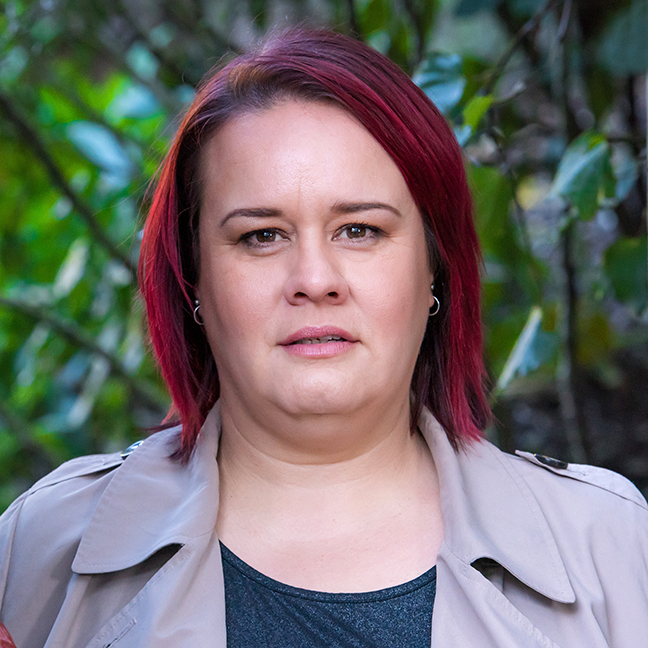Amber Aranui
Iwi
Ngāti Kahungunu, Ngāti Tūwharetoa, Waikato
Qualifications
PhD Wgtn, MA Auck, BA Wgtn
Profile
Amber is a curator at the Museum of New Zealand Te Papa Tongarewa, where she has worked since 2008. Her role at the museum began as the provenance researcher for the Karanga Aotearoa Repatriation Programme where she remained for 12 years. In 2021, Amber moved into the Mātaranga Māori curatorial team at Te Papa where her repatriation work continues to develop along with her other interests in the history of Aotearoa and our connection to the wider Pacific, utilizing her background in Anthropology (BA) and Archaeology (MA).
In 2018 she received her PhD in Māori Studies which focused on the repatriation of Māori ancestral remains. More recently Amber has focused on projects where she is able to work directly with her iwi Ngāti Kahungunu.
Amber has had a long history with Te Kawa a Māui, including tutoring and lecturing on courses such as MAOR202, MAOR203 and MAOR302. She is currently a research associate on the Te Whakaheke o Te Wai project undertaking research on Heretaunga groundwater.
Research
Amber is currently engaged in a research project called Te Whakaheke o Te Wai. Te Whakaheke o Te Wai is a project developed in partnership with GNS, Victoria University, Te Taiwhenua o Heretaunga, Ngāti Kahungunu Iwi Incorporated and the Hastings Regional Council to undertake research into the Heretaunga Aquifer. Using Isotope testing to age and identify the pathways and origins of the various waterways and the aquifer itself and creating a predictive model using data collected by council and mātauranga ā-hapū to understand the changes over time, it is hoped that this project can provide advice on water quality and source protection. It is hoped that this projects success can then be applied to other regions where water quality and quantity is an issue. In June 2022 Amber presented some of her research as part of the TKAM seminar series. The presentation discussed the process of combing two knowledge systems, mātauranga Māori and Western Science, to learn more about the Heretaunga Aquifer and identify ways in which to protect it for future generations.
Amber's PhD research examined the issues relating to the repatriation and 'scientific research' of Māori and Moriori ancestral remains. "The thesis examined these issues from Māori and Moriori perspectives. These perspectives have not been studied in detail before, so the research has addressed an important gap in the scholarship on repatriation, especially considering the ethical issues associated with the treatment of the dead." Amber has a background in Archaeology (MA) and Anthropology (BA), she has been a researcher for the Karanga Aotearoa Repatriation Programme based at the Museum of New Zealand Te Papa Tongarewa since 2008. It was her initial involvement in this programme that stimulated her desire to engage in PhD research on this topic. Amber hopes that her continued research will contribute to the wider knowledge of repatriation and that it will aid in the facilitation of relationships between the scientific community and iwi.
Selected recent publications
Aranui, A. 2021. Tahuri Ana Te Tai – The changing tide of repatriation in current museology. Uneven Bodies. New Plymouth: Govett-Brewster Art Gallery.
Halcrow, S., Aranui, A., Halmhofer, S., Heppner, A., Johnson, N., Killgrove, K., & Schug, G. 2021. Moving beyond Weiss and Springer’s Repatriation and Erasing the Past: Indigenous values, relationships, and research. International Journal of Cultural Property, 28(2), 211-220.
Mohi, R., Aranui, A. 2020. Te Whare o Heretaunga: A Journey of Rediscovery. Tuhinga 31:42-55.
Aranui, A. 2020. Restitution or a Loss to Science? Understanding the Importance of Māori Ancestral Remains. Museum and Society, 18(1), 19-29.
Aranui, A., Mamaku, T. A. 2020. The Importance of kaitiakitanga (guardianship and care) and rangahau (research) for the Karanga Aotearoa Repatriation Programme. In: Meloche, C. H., Spake, L., and Nichols, K. L. (eds.) Working with and for Ancestors: Collaboration in the Care and Study of Ancestral Remains. London: Routledge, pp91-102.
Aranui, A., Fforde, C., Pickering, M., Knapman, G., Turnbull, P. & Keeler, H. 2020. ‘Under The Hammer’: The Role of Auction Houses and Dealers in the Distribution of Indigenous Ancestral Remains. In: FFORDE, C., MCKEOWN, C. T. & KEELER, H. (eds.) The Routledge Companion to Indigenous Repatriation: Return, Reconcile, Renew. London: Routledge.
Aranui, A. 2020. Uses and Abuses: Indigenous human remains and the development of European science: an Aotearoa/New Zealand case study. The Routledge Companion to Indigenous Repatriation, 1ed, 400-412.
Aranui, A. 2018. Te Hokinga Mai O Ngā Tūpuna: Māori Perspectives of Repatriation and the Scientific Research of Ancestral Remains. [Doctoral thesis, Wellington University].
Aranui, A. 2017. The Importance of working with Communities – Combining Oral Histoy, the Archive and Institutional Knowledge in Provenance Research. A Repatriation Perspective. In: FÖRSTER, L., EDENHEISER, I., FRÜNDT, S., HARTMAN, H. (eds.) Provenienzforschung zu ethnografischen Sammlungen der Kolonailzeit: Positionen in der aktuellen Debatte. München: Arbeitsgruppe Museum der Deutschen Gesellschaft für Sozial- und Kulturanthropologie.

